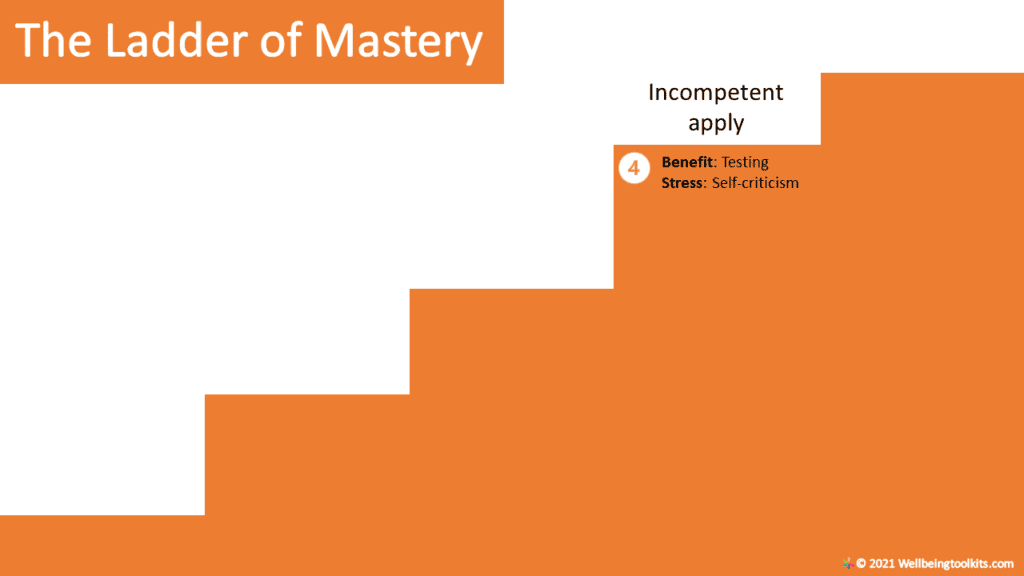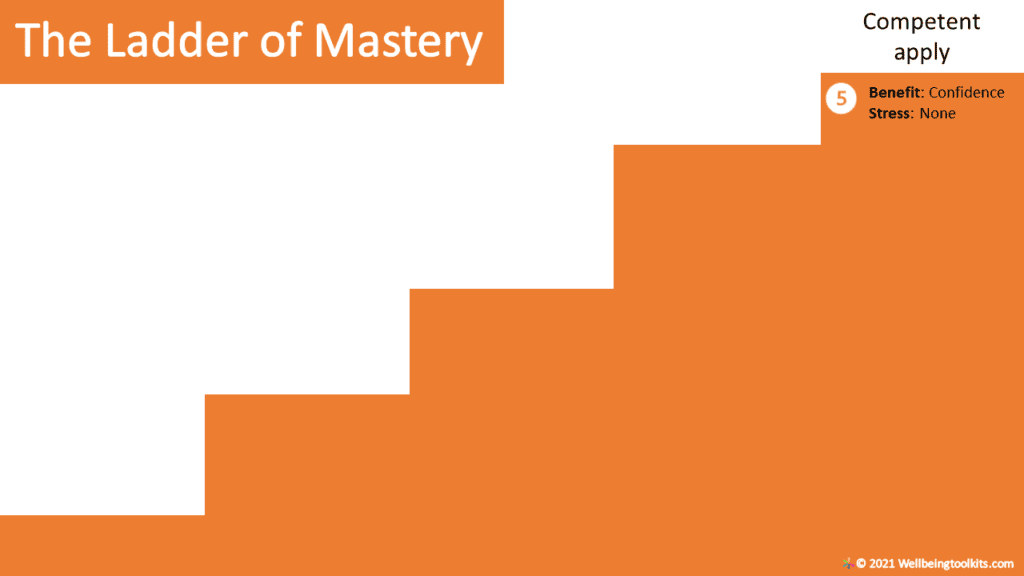
To achieve mastery in any thing in life you go through 5 levels in the ladder of mastery that starts with not aware, then aware but not knowing, then knowing without applying, then incompetent applying, and finally competent applying or mastery level.
Each step has its own benefit and stressor and I added solutions to overcome stressors for each step so you can have an easier journey through the ladder.
Importance of knowing the ladder of mastery
The importance of knowing this is huge because of the following:
1- Understanding the complete journey: now you can see where you are, where is the destination and where you are throughout your journey to mastering a specific topic.
2- Boosting confidence: with each step you have an added value that boosts your confidence each time you progress.
3- Knowing the roadblocks ahead: with each step you have a benefit and also a stressor that can slow you down or stop you completely if you don’t do something about it.
Let’s find out about those 4 steps
The Ladder of mastery: How you’re moving from 0 to mastery
First step: Not Aware

At this stage you’re not being aware of a tool that can have an impact in your life, whether it’s productivity maybe or public speaking for example.
The Benefit here is no stress.
Because you don’t know that tool exists, you can’t be stressed about not having it. It’s hard to be stressed about not having a thing that you don’t know in the first place.
It can also include knowing about a topic or a tool but not relating its value to your life. So you may know what public speaking is, but you’re not yet linking its importance in your career for example.
The stressor here is being relatively late in knowing.
Before I keep going, I have to clarify that I’m an advocate of “being late better than never” concept in everything.
(Except if you’re being late with meeting your wife. Never showing can be safer :D)
With that being said, sometimes there’s this small painful feeling that we ought of knowing this earlier.
To understand this point better, let me ask you this:
“what is or are the things that you wish you have learnt earlier in your life?” That by learning them, your life right now could have been into a better place
I bet that there is at least one thing you wish you knew earlier. It applies to “I wish I knew this in my 20s or 30s” situations.
Solution for this stressor:
It’s a minimal to moderate stress and it’s not usually a showstopper so nothing to worry about so far.
1- Reassure yourself that indeed late is better than never so you’re in better shape than not knowing at all.
2- Build the habit of quick and frequent learning, for the long run:
- Set aside 30 minutes of reading everyday. Any type of reading will work for that matter on any format, books, articles, magazines, newspaper.
- Subscribe and follow figures you relate to on social media like youtube, twitter, LinkedIn, or Facebook. They could be bill gates level of famous or social media influencers you relate to on youtube or elsewhere for some topics.
Second step: Being aware but not knowing

Once you realize the importance of a certain tool in your life, you move one step up the ladder.
The benefit here is benefit of being aware.
Now you are aware of either the existence of the tool and or its relevance and possible impact on your life.
So, you’ve read a book or watched a video, or listened to a podcast where you realized how rewarding it is to learn about public speaking, and how it can take your career or life to the next level.
The stressor here is not knowing.
Now you are aware that public speaking is a necessary tool to have with the impact it can add to your life, but you don’t know how to be one.
You don’t know what to do with the material, or how to control the stage, or how to control yourself when speaking, etc.
Staying at this stage leaves you with the knowing about a solution but can’t have it. Like being near water and can’t drink.
Starting this stage forward, the strength of stressors gets heavier cause with this step and the ones to come, you realize that the solution to your problem or the opportunity to your situation is getting closer and closer to have the better life and wellbeing you want.
Solution to stressor:
1- Get information
Since at this stage you seek information, you can follow the “more is more rule” that applies for the information type of reading which also applies to listening or watching if you choose those as your preferred learning platforms.
2- Be mindful of time and quantity
With that being said, aim to learn the minimum amount that will get you the minimum needed information to get you going as soon as possible.
You don’t want to spend your lifetime gathering information. You want to have just enough to take the next step.
On average, it’s about 1-2 books if you’re going to read, or interviewing 1-2 experts in the field, or listening to 1-2 books or equivalent material like podcasts.
Third step: Knowing but not applying

You’re getting closer. Now you know how to get to the solution to your problem. But, you realize something else is required.
The benefit here is knowing information
So, you have read a book or two about public speaking and how to be an effective one. You’ve taken notes and maybe taken couple of courses or badges about it.
Now you know theoretically how to prepare the material, how to adjust your body, and how present effectively to deliver your message.
But till this point, it’s just theories. In this step you’re not yet in front of an audience speaking.
It’s like learning how to swim from books without checking how long you’ll last in the pool. Or learning how to drive from the instructors before stepping into the car.
You know what to do before turning, but will you really remember to do it at all, or even do it right?
The stressor here is self-doubting: both information and ability
Because this step is about gathering information, one can too far with this, reading 5 or 6 books.
What you may not realize is that, with the 2nd book you read on the subject, you find out more insights and tips that the 1st book didn’t cover, and you see them as valuable too.
This leads you to think of what the 3rd and 4th books will have also, that you may deem necessary as well. Sometimes it might happen that one book contradicts some of the tips provided in the other.
Now you’re self-doubting the information you are gathering and before you know it, you enter the “what else loop”. What else can the next book provide me with?
The problem here is spending too long gathering information and you will lose interest in the end and become more stressful than you started because you haven’t seen any results yet.
The other stress will be self-doubting your ability of to demonstrate what you have learnt on reality.
Here you’re asking yourself questions like:
- Am I going to be good at it?
- Am I going to be good at public speaking?
- Will I fail?
- What will I look like?
Even if you’re comfortable with the information you have and decided it’s enough, stopping at this step will corner you with being not quite sure of your ability to use the tool.
This is where reading becomes stressful, specially reading self-help books, as you get more confused with more information or you see the solution comes closer each time but you’re not doing anything practical about it.
This is one of the 6 reasons why self-development books don’t work as you expect
Solution to self-doubting stressor:
1- Less is more
Like I mentioned in the 2nd step solution, only read 1-2 high rated books that you select as best as you can. More learning isn’t necessary at this point in time.
Here you need the minimum information that can get you going.
2- Apply small and early
Proceed as early as possible to the apply step and start applying what you have learnt in a small scale.
If you’re trying to master public speaking tool, start thinking of small-scale opportunities.
Personally, I started with telling stories to my kids before sleep. It’s a small, and friendly audience with topics that you can master diverse messages, emotions, tones, pace, etc.
Then I progressed to small meetings within my team. Then I took it further and started practicing it with large meetings with different teams and groups.
Any small steps that you can take to apply as early as possible. While applying, you may identify more things to learn but at least then, you’ll be learning more in a strategic way.
Fourth step: incompetent applying

You reach this step when you start applying what you have learnt and put it into real practice. This where you start practicing your public speaking skills and the information you gathered earlier.
The benefit here is testing both information and your ability
Now you can know if the information you have so far is enough to get you going or if you still need few more specific ones.
Also here you can measure your readiness and where you are in the spectrum of mastery of that tool or topic. Here you give yourself an initial score to improve on later.
The stressor here is self-criticism
because when you start applying and practicing anything, almost always you start with being incompetent at it, you’re not having it under control yet, and you’re making mistakes.
Now your self-criticism shows and starts telling you that you’re not good enough, or you should back off, and so on.
Stopping at this stage will lock you with this stressor of self-criticism and you can image what quality of life you’ll be having.
Solution to this stressor: Practice, Practice, Practice
The only way you get rid of this self-criticism stressor is if you kept practicing the skills and the information you’ve learnt and never stopped except for self-correction if needed.
Think about riding your bike, how was it when you started and how is it now. Want to know where the shift happened? It was when you tried what your father taught you in theory and kept getting up after falling.
It wasn’t about having more information; it was about more application.
Reading gives information, and Application gives Transformation.
Self
Fifth Step: Competent applying

This is the mastery level. This is where you get your black belt for public speaking art.
This is where the skill you wanted to learn becomes a second nature to you.
The benefit here is Confidence
You’re confident of using the tool to your advantage with no or little challenges. Even if small challenges presented, you figure your way to overcome them easily.
In this step, self-criticism moves away with more applying and it disappears almost completely.
The stressor here is.. None
I tried finding a stressor here, but in fact there isn’t one here.
Again, think about your learning to ride the bike or driving or swimming. If you’re really good at them, you do them without thinking and you have no stressors about them at all.